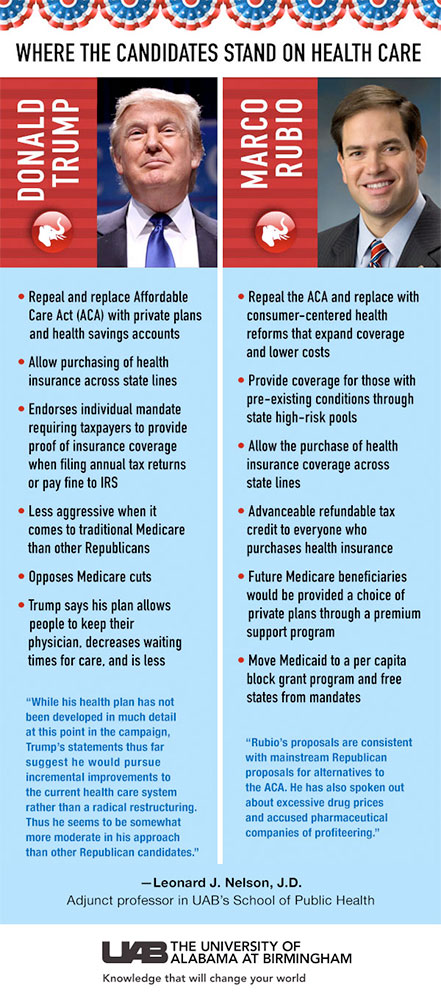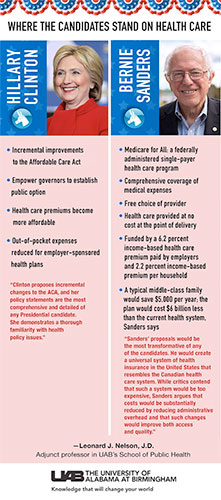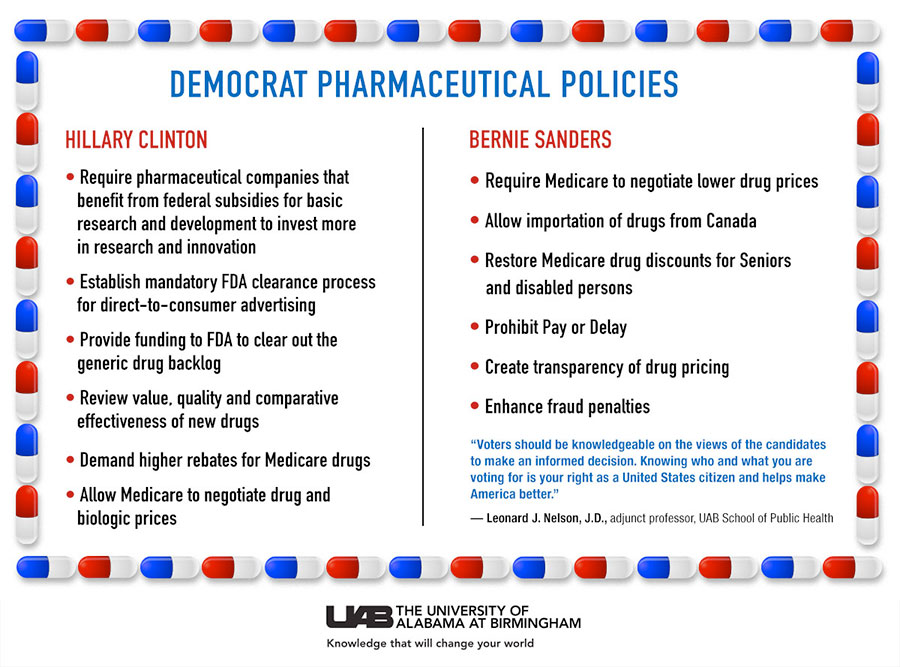The Alabama Legislature passed a bill in May 2015 scheduling the Alabama presidential primary for March 1, 2016, one week earlier than in previous years. As a result, Alabama voters will be part of the SEC primary and play a more significant role in the presidential candidate selection process.
Leonard J. Nelson III, J.D., adjunct professor at the University of Alabama at BirminghamSchool of Public HealthDepartment of Health Care Organization and Policy, provides an expert overview of the candidates’ stances on health care policy.
“Voters should be knowledgeable on the views of the candidates to make an informed decision,” Nelson said. “Knowing who and what you are voting for is your right as a United States citizen and helps make America better.”
 Click to enlargeRepublican presidential candidates
Click to enlargeRepublican presidential candidates
Donald Trump, U.S. Sen. Marco Rubio and U.S. Sen. Rafael Edward “Ted” Cruz are on the Republican presidential primary ballot in Alabama.
Donald Trump
Trump, the front-runner in this election, proposes to repeal and replace the Affordable Care Act with private plans and health savings accounts, as well as allow purchasing of health insurance across state lines.
Despite his opposition to the ACA, Trump has endorsed the individual mandate, a particularly controversial provision of the ACA that requires taxpayers to provide proof of insurance coverage when filing an annual tax return or pay a fine to the IRS.
Nelson says Trump also seems less aggressive when it comes to traditional Medicare than other Republican candidates. He has said that he would take care of people at the bottom through concepts similar to Medicare and has indicated his opposition to Medicare cuts.
Trump claims that his reforms will allow people to keep their physician, decrease waiting times for care and be less expensive than the ACA. When it comes to prescription drugs, Trump focuses on allowing Medicare to negotiate drug prices.
“While his health plan has not been developed in much detail at this point in the campaign, Trump’s statements thus far suggest he would pursue incremental improvements to the current health care system rather than a radical restructuring. Thus, he seems to be somewhat more moderate in his approach than other Republican candidates,” Nelson stated.
Marco Rubio
U.S. Sen. Marco Rubio proposes to repeal the ACA and replace it with consumer-centered health reforms that expand coverage and lower costs. Rubio has indicated he will provide coverage for those with pre-existing conditions through state high-risk pools and allow the purchase of health insurance coverage across state lines. He proposes an advanceable, refundable tax credit to everyone who purchases health insurance.
Rubio has stated he would not make any significant modifications in traditional Medicare and Medicare Advantage for current senior citizens. Going forward, Rubio proposes that future Medicare beneficiaries be provided a choice of private plans through a premium support program. Rubio would move Medicaid to a per capita block grant program and free states from mandates.
“Rubio’s proposals are consistent with mainstream Republican proposals for alternatives to the ACA,” Nelson said. “He has also spoken out about excessive drug prices and accused pharmaceutical companies of profiteering.”
Ted Cruz
The junior U.S. senator from Texas, Cruz proposes to repeal and replace the ACA, but he has not provided a comprehensive proposal at this time. Nelson says he intends to allow the purchase of insurance across state lines, expand health savings accounts and “de-link” health insurance from employment.
In an Oct. 22, 2015 Op-ed, Cruz announced he was introducing a bill to reform the FDA by focusing on innovation and replacing its outmoded drug-approval process. Specifically, Cruz supports reciprocal drug approval so that drugs and devices approved in other countries could more expeditiously be sold in the United States.
Cruz has also endorsed the approach taken by the Accelerating Medicine Partnerships, a private-public partnership among the NIH, FDA, 10 biopharmaceutical companies and several nonprofit companies to identify and expedite approval of new diagnostics and treatments.
“At this time, Sen. Cruz has not proposed a comprehensive plan to replace the Affordable Care Act; but his comments suggest he would support a much reduced role for the federal government in the regulation of health care,” Nelson said.
 Click to enlargeDemocratic presidential candidates
Click to enlargeDemocratic presidential candidates
Voters in the Democratic presidential primary in Alabama have the choice of voting for Hillary Clinton, former secretary of state and U.S. senator from New York or Bernard “Bernie” Sanders, a junior U.S. senator from Vermont.
Hillary Clinton
During her tenure as first lady, Clinton played a leading role in developing a national health care reform proposal in 1992-1993. Her extensive experience set the stage for detailed proposals on health care policy during her current campaign for the presidency.
Clinton proposes to retain and enhance the role of the health care exchanges created by the ACA by making premiums more affordable and reducing out-of-pocket expenses.
In addition, she says she will attempt to boost exchange enrollments by investing in more navigators and expanding outreach efforts. Clinton says she will encourage the development of public options for health insurance coverage to be made available for the exchanges through the granting of state innovation waivers.
“Clinton proposes incremental changes to the ACA, and her policy statements on pharmaceuticals are the most comprehensive and detailed of any of the presidential candidates,” Nelson said. “She demonstrates a thorough familiarity with health policy issues.”
Bernie Sanders
In January, Birmingham, Alabama, welcomed Sanders, who proposes a sweeping policy change through the creation of a federally administered single-payer health care program, known as Medicare for All.
According to Nelson, this single-payer system would provide comprehensive coverage of hospital services, physician services, long-term care, vision, hearing, dental and mental health care for all United States citizens through government insurance.
Sanders says the plan would allow United States citizens free choice of provider, and care would be provided at no cost at the point of delivery without deductibles, copays or coinsurance.
Sanders proposes that this new health care system be funded by a 6.2 percent income-based health care premium paid by employers and 2.2 percent income-based premium per household. He contends that a typical middle-class family would save $5,000 per year and that his plan would cost $6 billion less than the current health system.
“Sanders’ proposals would be the most transformative of any of the candidates’ proposals. He would create a universal system of health insurance in the United States that resembles the Canadian health care system,” Nelson said. “While critics contend that such a system would be too expensive, Sanders argues that costs would be substantially reduced by reducing administrative overhead and that such changes would improve both access and quality.”
Pharmaceutical regulations
Both Clinton and Sanders have also addressed pharmaceutical reform during the campaign.
Clinton, who visited Montgomery, Alabama, in December, supports several policy options to address problems in the pharmaceutical industry. She proposes to:
- Require pharmaceutical companies that benefit from federal subsidies for basic research and development to invest more in research and innovation;
- Eliminate “corporate write-offs” for direct-to-consumer advertising;
- Establish mandatory Food and Drug Administration clearance process for direct-to-consumer advertising;
- Require health insurance plans to place a monthly fee of $250 on covered out-of-pocket costs for FDA approved drugs;
- Provide funding to FDA to clear out the generic-drug backlog;
- Reduce exclusivity for biologics from 12 to seven years;
- Establish expedited review for biosimilar products, a biological product that is approved based on a showing that is highly similar to an FDA-approved biological product and does not have clinically meaningful differences in terms of safety and effectiveness;
- Prohibit pay-for-delay arrangements that keep generics off the market;
- Allow importation of drugs from abroad;
- Review value, quality and comparative effectiveness of new drugs;
- Demand higher rebates for Medicare drugs; and
- Allow Medicare to negotiate drug and biologic prices.
Sanders has also discussed reforms in the pharmaceutical industry. He proposes to:
- Require Medicare to negotiate lower drug prices;
- Allow importation of drugs from Canada;
- Restore Medicare drug discounts for seniors and disabled persons;
- Prohibit pay-for-delay;
- Create transparency of drug pricing; and
- Enhance fraud penalties.
Between now and the primaries on March 1, Republican presidential candidates Rubio and Trump, as well as Democratic presidential candidate Hillary Clinton, will visit various cities in Alabama.
